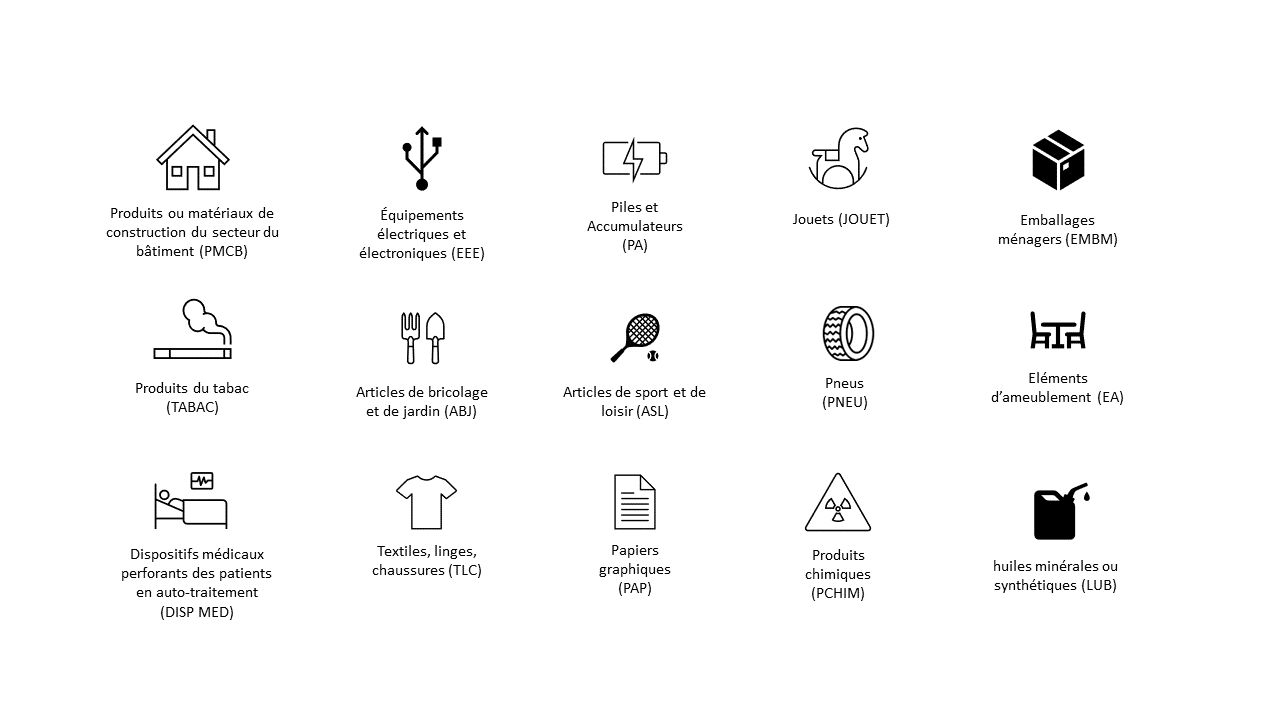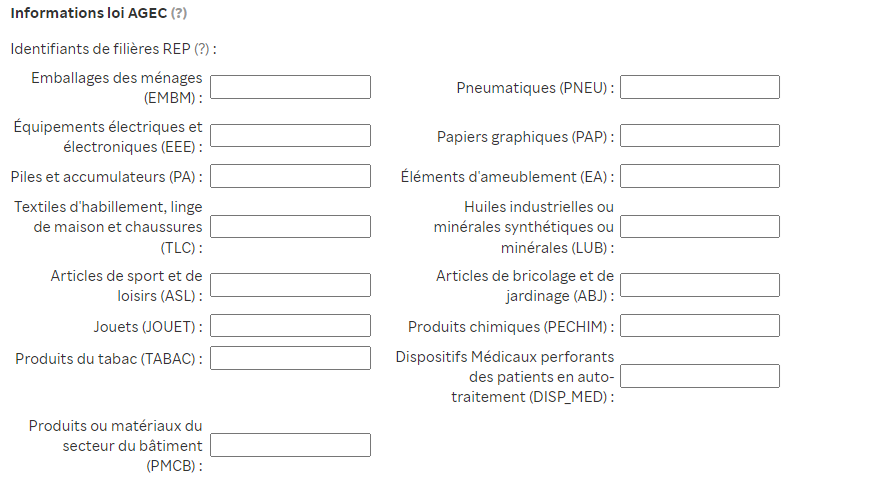Extended Producer Responsibility (EPR)
Since January 1, 2022, certain obligations contained in French law no. 2020-105 relating to the fight against waste and the circular economy (“AGEC”) have been applicable, and notably involve obtaining and transmitting a unique identifier (“IDU”). These obligations concern you even if you are simply a reseller of products on the platform.
From October 09, 2023, Rakuten will provide you with its own default eco-contribution deduction mechanism for each of your sales on the Platform, based on the “we declare for you” principle. Find out more about how “REP by RAKUTEN” works on the dedicated help page.
Below you’ll find the key points to bear in mind from these recent EPR developments, and the steps you’re likely to need to take if you’re concerned.
Please note: This help section is purely informational and educational, and does not constitute an exhaustive and detailed summary of current regulations, nor a form of legal advice from Rakuten. Each seller is responsible for ensuring that his or her activity complies with current laws and regulations, and for taking the necessary steps on his or her own initiative.
The AGEC law extends the system of Extended Producer Responsibility (EPR) in France. Based on the “polluter pays” principle, EPR aims to make the manufacturer, seller or importer responsible for the various stages in the life of a product, from its creation to its reuse or recycling. To this end, the law makes it compulsory to join, pay an eco-contribution and declare to approved eco-organizations the products placed on the market in each sector.
The AGEC law makes it compulsory to join, pay a contribution and declare to approved eco-organizations the products placed on the market in each sector (the famous “ecocontribution”), in order to finance the end-of-life of the products that generate it. By joining the eco-organizations that cover the products you put on the French market for the first time, or by purchasing these products directly in France, you fulfill your obligations and obtain either your IDU or your supplier’s IDU. Note that if you operate on several marketplaces, all these identifiers are the same, as they are individual.
The law also obliges distributors of certain products to offer free take-back of a used product of the same type in exchange for the purchase of a new product (“1-for-1” take-back).
As a marketplace, we are unfortunately required by law to collect from our sellers their unique identifiers (“IDU(s)”), which certify that they are members of the aforementioned eco-organizations and therefore that your products comply with EPR, as well as, where applicable, their own 1-for-1 take-back solutions.
Rakuten allows you to include several aspects of EPR in your business by default, using EPR by RAKUTEN. Find out more on this page.
If you sell new products in different channels on Rakuten, chances are you’ll need to submit one or more IDUs. There are around twenty channels applicable in France, including the following:
Each of your sales in these channels will give you obligations linked to the AGEC law and EPR.
 Each of your sales in these channels will give you obligations linked to the AGEC law and EPR.
Each of your sales in these channels will give you obligations linked to the AGEC law and EPR.
You are a Producer (in the legal sense) if you are the first to market a product on the
French market.
This is the case if you are, for example, the manufacturer (a manufacturer who sells under its
own brand name products made in France), the importer (who imports equipment from a
country outside the EU), the introducer (who imports equipment from a country outside the
EU), the distance seller (who sells equipment directly to remote households from abroad), or
the reseller (under your own brand name only), of the products concerned.
In this case, you are required to take all the necessary steps to comply with the law, which
gives you two options:
– Setting up an approved individual collection and treatment system, or ;
– Managing your obligations by joining the EPR Organizations approved for each industry, and
paying a financial contribution (Eco-Fee) in return.
So, to be compliant, you need to join the EPR Organizations for each industry in which you
sell your products:
| Industry | Category | Membership |
| Household electrical and electronic equipment industry (EEE) | EEE | ECOLOGIC |
| EEE, lamps | ECOSYSTEM | |
| Solar pannels | SOREN | |
| Packaging industry (EMBM) | EMBM | CITEO |
| EMBM | LEKO | |
| Batteries industry (PA) | PA | SCRELEC |
| PA | COREPILE | |
| Textile industry (TLC) | TLC | REFASHION |
| Toy industry (JOUET) | JOUET | ECOMAISON |
| Furniture industry (EA) | EA | VALDELIA |
| EA | ECOMAISON | |
| Sporting goods and leisure industry (ASL) | ASL | ECOLOGIC |
| Tire industry (PNEU) | PNEU | FRP |
| PNEU | ALIAPUR | |
| Chemical products industry (PCHIM) | categories 3 to 10 | ECODDS |
| Small fire extinguishers | ECOSYSTEM | |
| Pyrotechnic products | PYREO | |
| Oils and lubricants industry (LUB) | LUB | CYCLEVIA |
| Papers industry (PAP) | PAP | CITEO |
| Perforating medical devices for self-treatment patients industry (DISP MED) | DISP MED | DASTRI |
| DIY and gardening industry (ABJ) | category 2° – Thermal motorized machines and appliances |
ECOLOGIC |
| categories 3° – DIY equipment and 4° Products and equipment for garden maintenance and landscaping |
ECOMAISON | |
| category 1° – Painter’s tools | ECODDS | |
| Construction products and materials industry (PMCB) | Categories 1 and 2 | VALOBAT |
| Category 1 (Mineral products and materials) |
ECOMINERO | |
| Category 2 (Non-mineral products and materials) |
VALDELIA | |
| Category 2 (Non-mineral products and materials |
ECOMAISON | |
| Tobacco products industry (TABAC) | TABAC | ALCOME |
If you are a reseller of products that are already subject to the contribution, then even if you are not the first person to put them on the market, you can still resell products that fall within the scope of the law.
In this context, if you buy only and exclusively from French producers for each of the sectors in which you sell your products, you don’t have to take any steps yourself to join and pay the eco-contribution.
L’Article R541-167 2° du Code de l’environnement prévoit néanmoins, afin que nous puissions nous assurer de la conformité des produits, que vous nous fournissiez “[…] 2° l‘identifiant unique délivré en application de l’article L. 541-10-13 […] ou l’identifiant unique délivré au producteur du produit et qui a été communiqué au tiers proposant le produit à la vente conformément à l’article L. 541-10-10”.
However, Article R541-167 2° of the French Environment Code requires you to provide us with “[…] 2° l’identifiant unique délivré en application de l’article L. 541-10-13 […] ou l’identifiant unique délivré au producteur du produit et qui a été communiqué au tiers proposant le produit à la vente conformément à l’article L. 541-10-10″, so that we can ensure product compliance.
As a result, and because you are merely a “reseller” (the “third party offering the product for sale”), we ask you to retrieve the IDUs from your Producer, who will be legally obliged to communicate them to you in accordance with article L. 541-10-10 of the French Environment Code. In most cases, these IDUs can be accessed directly from their general terms and conditions of sale or on the dedicated Syderep search engine: https://syderep.ademe.fr/public/acteur/recherche?raisonSociale=&idUniqueFiliere=
Finally, you must be in possession of this IDU in all cases, should a buyer ask for it, in addition to having to pass on the exact price of the ecocontribution on your sales without any rebate (article L541-10-20 of the same code).
PLEASE NOTE: For simplicity’s sake, we’ll let you add just one number per channel (even if you have several suppliers). Choose the number of your most important supplier per channel, if applicable, or the one that seems most coherent.
Yes, as a matter of principle, EPR only applies to new products you have sold on French territory.
ATTENTION: As an online (distance) seller, even as a simple reseller, eco-organizations consider that the products you sell are packaged by you (even if they are second-hand). Packaging becomes subject to ecocontribution.
There are therefore two types of packaging:
- The product packaging itself, when it exists (otherwise known as “primary” packaging)
- Your product’s shipping parcel (otherwise known as “secondary” packaging).
Both types of packaging are part of the packaging chain. To help you meet your regulatory obligations, you can join directly:
- Citéo: https://www.citeo.com/
- Or Léko: https://www.leko-organisme.fr/
You can then directly fill in the IDU provided.
Once you have your IDUs for each of your channels, simply follow the steps below:
- Log in to your seller account.
- From your Merchant Center, go to the “Preferences” tab.
- In the “AGEC law information” section of your seller preferences, you can enter all the numbers you have.
- At the bottom of the page, click on “Validate”.
 Please note: your numbers must respect the IDU format. This is made up of 15 characters, starting with FR, 6 digits, 1 “underscore”, then 2 digits (representing the die type identification code), and 4 random characters. Here’s an example of an IDU with the correct format:
Please note: your numbers must respect the IDU format. This is made up of 15 characters, starting with FR, 6 digits, 1 “underscore”, then 2 digits (representing the die type identification code), and 4 random characters. Here’s an example of an IDU with the correct format:
FR123456_XXPLRZ.
You must send your IDU to Rakuten as soon as possible, for each channel in which you sell your products. To do this, go directly to your seller area and enter your login details:
If you encounter a problem or if you have more than one IDU, because you are the reseller of different Producers or at the same time Producer and reseller or any other hypothesis, contact your account manager and send your IDUs explaining the problem.
If you sell products subject to EPR via the Rakuten platform without registering with an eco-organization and/or if you do not provide Rakuten with your unique identifier or any other evidence that you have fulfilled your waste prevention and management obligations, RAKUTEN will directly deduct the eco-contribution and pay it to the eco-organizations on your behalf through its “EPR by RAKUTEN” mechanism.
EPR by RAKUTEN” thus brings back the deduction of these amounts in real time, and constitutes the default mechanism for deducting the eco-tax from each of your sales on the Platform, in accordance with our Special Pro Conditions, which provide for the rebilling of all amounts paid on your behalf under the conditions set out in the Pro Price List.
These sales no longer need to be declared in your declarations to eco-organizations. However, this mechanism does not enable you to fulfill all your EPR obligations, and you remain responsible for ensuring that your activity complies with the laws and regulations in force, and for taking the necessary steps on your own initiative. This includes communicating your unique identifier.
For full details and explanations of this mechanism, please visit our dedicated help page.
If you sell products in a sector not concerned by “EPR by RAKUTEN”, and as indicated in the Special Pro Conditions, Rakuten will re-invoice you in full for the amounts paid on your behalf under the conditions set out in the Pro Fee Schedule, and in accordance with the collection scales of the eco-organizations.
ATTENTION: Rakuten will use estimates of your sales and simplified declaration scales, which will result in potentially much higher amounts than if you join and contribute on your own or with the help of a facilitator, and charges for managing your obligation on your behalf.
Please note:
This obligation to communicate an IDU applies not only to the Producer, but to all Marketplace sellers of products subject to one or more EPR schemes. In fact, the buyer of one of your EPR products is entitled to ask for your unique identifier. If so, you must provide it. If you are a reseller of products already on the market, be sure to ask for your supplier’s UID so that you can communicate it. See Section
Other resources are available in French from the following links:
- General framework for Extended Producer Responsibility: https://www.ecologie.gouv.fr/cadre-general-des-filieres-responsabilite-elargie-des-producteurs
- Extended Producer Responsibility (EPR) channels on the ADEME (French Agency for Ecological Transition) website: https://filieres-rep.ademe.fr/
- ADEME/SYDEREP FAQ: https://syderep.ademe.fr/faq
If you sell one or more of the following products, you are also subject to the obligation to take back used products from your buyers:
- Electrical and electronic equipment (WEEE) (cell phones, multimedia equipment (TVs, games consoles, etc.), small and large household appliances, computer hardware and accessories, lighting, DIY tools, etc.),
- Household chemicals and chemical containers (from January 1, 2022) (glue, solvents, household plant protection and biocide products, fertilizers, pyrotechnics, fire extinguishers, heating fuel, resins, paints, varnishes, coatings, cleaners and strippers, etc.),
- Furniture and furnishings (from January 1, 2022) (table, chair, garden furniture, sofa, bathroom furniture, bedding, etc.),
- Single-use combustible gas cartridges (from January 1, 2022).
- Toys (from January 1, 2023)
- Sporting and leisure goods (from January 1, 2023)
- DIY and garden items (from January 1, 2023)
Please note:
If the products you sell are transportable without equipment, then collection from a local collection point is sufficient. In any case, you must inform your customers when they place their order of the procedures for taking back used products.
I’m required to take back used products. What should I do with rakuten?
If you sell products subject to the EPR obligation (see section “Am I concerned by the EPR obligation?“), in addition to registering with an eco-organization (see section “I am subject to the EPR obligation – What do I have to do? “), you must offer to take back your used product or have it taken back, free of charge, in exchange for the purchase of a product of the same type (a “1-for-1” trade-in) (e.g., when buying a TV set, take back an old TV set of the same type). This trade-in can take place :
- At the point of delivery of the new product;
- Or at a collection point near the point of delivery of the new product;
- Or by providing a return solution for the buyer (e.g. postal service or equivalent), when the product’s characteristics allow this.
You can update this information in your seller preferences. Please also clearly state in your ad the conditions for taking back the used product, as indicated in the previous point.
If you do not take back a used product despite the buyer’s request, Rakuten may be required to cover the cost of taking back the product for you.
In such a case, as indicated in the Pro Special Conditions, Rakuten will re-invoice you for all amounts paid on your behalf under the conditions set out in the Pro Price List.
Please note:
Taking back the product is free of charge for the buyer. Take-back may be refused if the used product presents an unavoidable risk to the health and safety of take-back personnel. In this case, you must inform your purchaser of the alternative conditions for the take-back.
